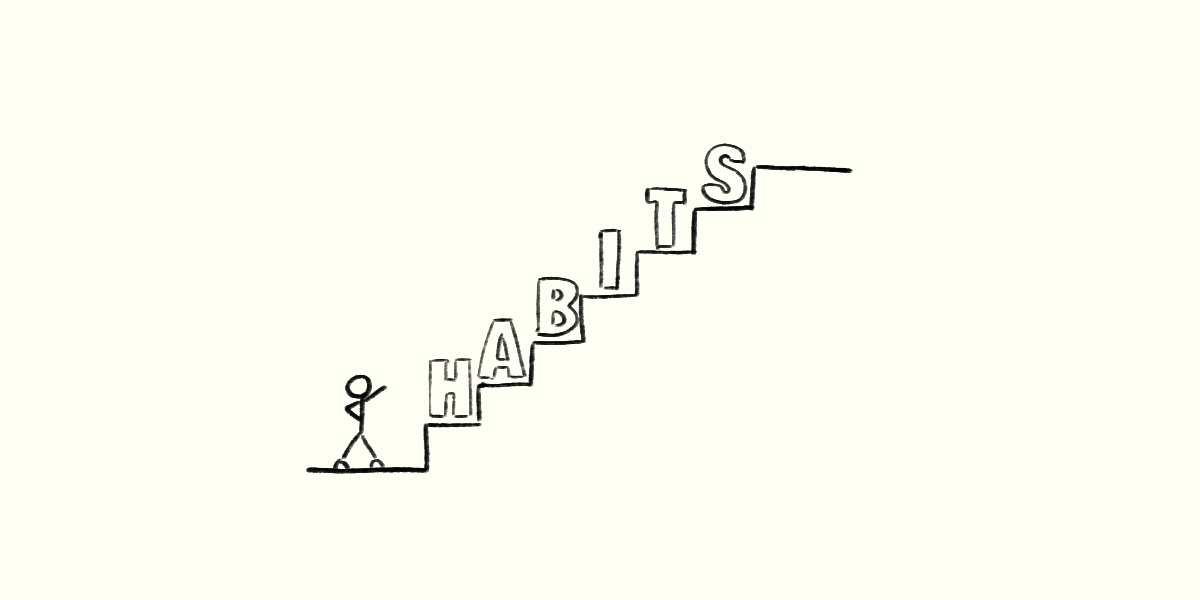This article explains how to set life goals.
This article is recommended for those who have felt the following:
- Wanting to set life goals but unsure how to do it.
- Feeling anxious about continuing with their current lifestyle.
- Craving for something exciting as they are bored with their current routine.
- Feeling pressure to strive towards goals after seeing others working hard towards theirs.
How I was Inspired To Set My Life Goals
I set my life goals after a particular conversation.
That day, after work, I was having a beer at a bar with a colleague.

Our conversation revolved around plans for the next long vacation.
He mentioned that he planned to think about life goals during the next vacation.
It seemed this wasn’t his first time; he had already considered life goals several times before.
Curious about why he felt the need to set life goals, I asked him.
He replied,
“I started setting life goals to feel a sense of fulfillment every day and boost my motivation.”
He continued,
“I’ve found that there are significant benefits to setting life goals. Sure, people can live without them. But living solely to achieve goals given by others feels empty. To feel fulfilled every day, you need to set your own goals.”
His words intrigued me deeply.
He joined the company around the same time as I did, is known for his hard work and is trusted by everyone.
Although it had only been about a year since we joined, I felt there was a significant gap between us.
I thought that setting my own life goals might bring me closer to his level.
So, I made up my mind to set life goals myself.
Then, 11 years have passed.
The 11 years since setting my life goals have been meaningful to me.
Most importantly, these 11 years have been incredibly enjoyable!
The inspiration for writing this article came from my desire to share these enjoyable experiences with others.
Next, I will outline the life goals I set and the current status of their achievement.
My Life Goals and Current Achievements

To develop the ability to earn money, I polished my sales skills
I aspire to be both mentally and financially independent.
I believe that having strong sales skills is crucial to being such an individual.
With sales skills, I can work in any company and also benefit when starting their own business.
With this in mind, I set the following specific goal:
Achieve the highest sales performance among employees in the same position.
I was able to achieve this goal.
Not only did I surpass my colleagues who joined at the same time, but I also achieved the highest performance in the history of the company.
Even now, I can hardly believe that I accomplished this record.
If asked to surpass this record again, I think I would definitely refuse.
The truth is, I was fortunate.
This is because many people supported me in reaching my goal.
Therefore, I am aware that I still need to further develop my sales skills.
However, the fact remains that I achieved this goal.
This experience has instilled unwavering confidence in myself.
To work abroad, not just in Japan
I always want to keep challenging myself.
Life without challenges is boring for me.
When I got used to working in Japan, I wanted to take on the challenge of working abroad.
Since I only speak Japanese, I wanted to experience working in other languages.
I was able to achieve this goal.
I currently live in Australia and work using English.
It has been a long challenge lasting over four years, but I’m glad I took on the challenge.
I not only improved my English skills but also made good friends by this challenge.
Earning enough from my business to support my family
I detest working under the direction of others.
Being unable to implement my ideas I believe in is a significant source of stress for me.
Interestingly, my grandfather also started his own business with the same mindset.
This may be something ingrained in me at a genetic level!
This goal is still a work in progress.
While I’ve started my own business, I haven’t yet reached the point where it covers all my living expenses.
However, I am determined to keep working towards this goal.
This blog is also part of this ongoing challenge.
Some may not see the above goal as significant.
But for me, it was a big challenge!
And it was 11 years of significant growth for me.
If I hadn’t set life goals, I wouldn’t have achieved the above goal.
In fact, I might not have even attempted the challenge.
Having experienced many benefits from setting life goals, I’d like to share my story.
The Benefits of Setting Life Goals (My Story)

I was able to feel a sense of accomplishment every day
By setting life goals and taking action, I was able to experience a sense of achievement.
This is because, since setting life goals, I have been committed to self-improvement.
Four years ago, I started studying English.
This was because I wanted to gain experience working in other countries, not just in Japan.
However, when I started studying English, I couldn’t speak it at all.
I had never used English in my work and personal life.
For many Japanese people, English feels like a language used on a different planet.
Japanese is a very unique language, so English and Japanese have no common elements.
However, I wanted to be able to speak English in the future, so I needed to start something.
So, I set a goal to have 30 minutes of online English conversation every day.
Continuing online English conversation every day was challenging, but I was able to feel a sense of accomplishment every day.
These small achievements brought fulfillment to my daily life.
When I started studying English, I was bored with my job and every day felt monotonous.
However, studying English provided me with moments of feeling my own growth.
Daily motivation management becomes easier
Thanks to life goals, managing daily motivation has become significantly easier.
This is because I realized that my work and studies contribute to achieving my life goals.
Specifically, I used to engage in sales activities during my time as a consultant.
At my company, every consultant had sales targets.
To advance in my career, achieving results in sales was essential.
However, I used to hate sales.
This was because I couldn’t bear the rejection of proposals I had worked hard to create.
Being rejected by clients made me feel miserable, as if I were being personally rejected.
So, I reluctantly dealt with sales activities.
However, since setting life goals, I’ve been able to change my approach to sales.
One of my life goals is to start my own business.
I hate working under someone else’s direction.
Therefore, I want to work with discretion on my own.
To do that, I want to earn a salary through my own business.
Sales skills are essential to succeed in entrepreneurship.
During my time as a consultant, I saw many entrepreneurs who had excellent services but couldn’t grow their companies.
This was because they didn’t put effort into consistent sales activities, even though they were good at pitching for funding.
To avoid similar failures, I resolved to work hard on sales.
When your attitude towards things changes, you can gradually achieve better results.
Since achieving good results, I have started to enjoy sales, which I used to dislike.
When you only consider the present narrow perspective, you tend to judge things based on your likes and dislikes.
However, when you reverse-engineer from your life goals, you can discover the meaning of striving for what you should be doing now.
I could improve my skills
By setting life goals, I was able to enhance my skills.
This is because setting goals helps me recognize the skills I lack.
In my case, I started studying English to work in countries other than Japan.
If I hadn’t set goals, I wouldn’t have been able to improve my English skills.
Perhaps the time I spent studying English would have been spent watching YouTube if I hadn’t set goals.
I need to discipline myself because I could spend all day watching YouTube.
Watching YouTube while lying in bed is indeed the best way to kill time.
But what would have happened if I had spent that time like that every day?
I became more decisive
Thanks to setting life goals, I believe my decisiveness has improved.
In life, there are situations where one must make courageous decisions.
Decisions like changing jobs or getting married can significantly alter one’s life.
Because such decisions involve risks, it’s common to procrastinate.
Even knowing that we may regret it later, we tend to choose the safer path.
Since setting life goals, I’ve become more decisive in such situations.
I realized that without making risky decisions, I couldn’t achieve my life goals.
For example, I made the decision to quit my job and study abroad in Australia.
My job in Japan had a good salary and great relationships with colleagues.
However, I knew that eventually, I would have to leave to achieve my life goals.
This was because the direction of the company’s business did not align with what I wanted to do.
It was a tough decision to leave, but it turned out to be the right one.
Now, I can challenge myself to do what I want and feel happy every day.
If it weren’t for my life goals, I wouldn’t have been able to make this decision.
Important Considerations When Setting Life Goals
Pitfalls of setting life goals
I’d like to share my own story of failure.
When I first set my life goals, I made a major mistake.
“Hmm, something feels off about this…”
That was my initial impression when I set my first life goal.
At that time, the goals I set for myself fell into two categories:
- Things expected of me by others Responsibilities at work, roles within the family, etc.
- Things I felt lacking compared to others around me Wealth, high status, respect from others
Goals like these don’t function well as life goals.
This is because they’re influenced by others’ expectations.
Goals influenced by others’ expectations are driven by obligation and external validation.
For me, such goals didn’t feel like something I genuinely wanted to achieve.
First, understand your own values

However, this book taught me the reasons for my failures.
This book is “The 7 Habits of Highly Effective People“
This book contains fundamental principles for personal growth and success.
It’s a bestselling book with over 40 million copies sold worldwide.
Although it’s a thick book, it has valuable content, so I highly recommend it to anyone who hasn’t read it yet.
In this book, when it comes to setting life goals, it recommends delving deep into your inner self.
To set life goals that you can commit to, it’s essential to first understand your own values.
By the way, your values are the thoughts and beliefs you’ve held onto for a long time.
For example:
- Valuing mental well-being over money
- Prioritizing family over work
- Maintaining a constant drive for self-improvement regardless of age
These kinds of beliefs are unlikely to change in the future.
The journey to achieving life goals isn’t short, lasting only a year or two.
It’s a goal you’ll face for a long period, perhaps even longer than your job or your closest friendships.
Deciding on such significant matters without self-analysis is risky.
Therefore, it’s crucial to set life goals rooted in your fundamental values.
In the next chapter, I’ll introduce questions and sample answers to help you understand your own values.
Questions to Set Life Goals
Here are five questions to help you articulate your values and goals.
I’ll also provide sample answers, so please feel free to answer these questions yourself.
Key Considerations When Answering Questions

When responding, there’s one crucial thing I want you to focus on: creating the right environment.
Find a quiet place where you can think alone, and turn off your smartphone before contemplating your answers.
In a noisy environment, good ideas are hard to come by.
List of Questions to Clarify Personal Values

Who are your role models?
List individuals you admire or respect, regardless of their background—whether they’re family members, friends, respected colleagues, prominent figures in business, or athletes.
If you’re struggling to think of someone immediately, it’s okay to choose someone you know well and like.
Once you’ve listed your role models, describe what aspects of their behavior, achievements, or character traits appeal to you.
This exercise will provide insights into your own values.
Example
1. Senior colleague at work
– Always maintains a positive attitude and refrains from complaining
– Has achieved success in numerous projects over the years
2. Friend, Person A
– Effectively balances family and work commitments
– Doesn’t procrastinate and tackles tasks promptly
3. Renowned athlete, Person B.
– Sets ambitious goals and doesn’t shy away from hard work
– Demonstrates excellent performance under pressure with calm decision-making
4. Father
– Maintains curiosity and interest in new things regardless of age
– Has a diverse circle of friends
Have, DO, Be List
Please list your desires.
To make it easier to list specific desires, let’s categorize them into three categories:
Have, DO, and Be.
When listing, please be as specific as possible.
For example, if listing “financial freedom,” write a specific image like “being able to go on a family trip overseas once a year.”
Example
Have
– Financial freedom to travel overseas once a year
– Esteemed reputation (being someone people turn to in times of need)
– Car (Mercedes-Benz)
– Home with a built-in home theater system
Do
– Travel with family once a year
– Start my own business
– Learn to speak another language
– Participate in the Honolulu Marathon
Be
– Someone who can assist those in need
– A person who values honesty and avoids telling lies
– Always striving to improve and grow
– Able to discern people based on their character rather than appearances
Bucket List for One Year Remaining
You have been diagnosed with one year left to live.
If you were to make the most of that year, what would you do?
Most of us rarely feel the urgency of a time limit in our everyday lives.
However, if the time we thought would continue indefinitely were suddenly limited to just one year, what would you do?
Example
– Visit my parents once a month
– Write a novel
– Keep a daily journal
– Ensure the success of the project I’m currently working on
– Participate in an amateur soccer tournament
– Apologize to friends with whom I’ve had disagreements
Action List for the Next 100 Years of Life
Now, let’s imagine you have another 100 years of healthy life ahead of you, where you can pursue whatever you desire.
Here, you are assumed to be in good health, and age is no barrier; you can adjust it freely.
What would you want to do with this life?
The aim here is to explore a wide range of possibilities for yourself.
Often, when discovering what we want to do, we are constrained by time.
Consequently, people tend to unconsciously give up on things they want to do.
Example
– Experience working in welfare-related fields
– Study abroad
– Make a movie
– Expand my circle of friends with common hobbies
– Aim to become a professional golfer
– Travel around the world
– Establish a company
– Mastering another language.
Values Clarification
Please list three to five values that you believe are important to you based on your responses to the previous questions.
Based on my experience, it’s appropriate to have three to five values.
Having too many can lead to forgetting them.
Next, provide an explanation for each value.
The explanation should clarify why you consider each value important.
Example
Value: Contribute to society
Explanation: I believe in contributing to the betterment of society, not just focusing on my own interests but also striving to make a positive impact on the broader community.
Value: Enjoyment in everything
Explanation: Finding joy in everything enriches life.
I want to spread happiness by sharing my smile, energy, and enthusiasm with those around me.
Value: Strive for independence
Explanation: I aim to achieve both financial and emotional independence.
I want to have the financial stability to support my family comfortably and the emotional resilience to find fulfillment in life.
Value: Cherish friendships
Explanation: Friends enrich life and bring joy.
Witnessing their happiness brings me joy as well.
Value: Love for nature
Explanation: I value and cherish the limited resources of our planet.
I strive to preserve nature and seek opportunities to immerse myself in its beauty as much as possible.
Deriving Life Goals from Values
Now it’s time to set life goals to put your values into action.
Based on the values you’ve discovered so far, write down your life goals.
Example Responses:
Value: Strive for self-reliance Life
Goals:
– Read every day for mental growth
– Start a business and earn a salary from my own venture
Value: Maintain good health Life
Goals:
– Avoid overeating and maintain current weight
– Run every day to prepare for completing a full marathon
Value: Family happiness Life
Goals:
– Greet my family members every day
– Go on a week-long vacation with my family once a year
– Engage in conversation with my children at least once a day
Setting Deadlines for Life Goals
Now, let’s set deadlines for the life goals you’ve listed so far.
Without deadlines, it’s challenging to take action indefinitely.
However, remember to set realistic deadlines.
Setting deadlines that are too ambitious can lead to giving up from the start.
Also, it’s okay if you can’t set goals for the distant future, like 10 years from now.
While it’s ideal to set them, thinking about the distant future can be challenging.
Furthermore, based on my experience, my goals change over time due to personal growth and environmental changes.
Example
– Save ¥300,000 by next year
– Complete a full marathon within two years
– Change jobs and increase income within three years
– Take my family on a trip to France within four years
– Start my own business within five years
Building a System to Remember Life Goals

Do you remember the goals you set at the beginning of the year?
There may be some goals that you’ve forgotten.
One of the main reasons why goals aren’t achieved is because they’re forgotten.
When I worked as a consultant, I noticed the same problem in many organizations.
Before conducting consulting sessions, we would diagnose the current state of the company.
During this process, we interviewed employees.
In these interviews, we asked employees about their goals.
We noticed a trend among low-performing employees.
When asked about their goals, they couldn’t answer.
They probably believed that completing their immediate tasks was the extent of their job.
Without remembering their goals, they couldn’t achieve them.
When performance evaluations came around, they would suddenly remember their goals and rush to work on them.
To avoid making the same mistake, let’s ensure we don’t forget our life goals.
The solution is simple.
Create an environment where you can see your life goals every day.
In my case, I use a piece of paper with my life goals written on it as a bookmark for my diary.

Of course, there are other methods you can use.
Choose a method that fits into your lifestyle.
It could be setting your phone wallpaper or putting them up somewhere in your room.
The key is to have a system in place so you don’t forget your goals.
The content for this time is concluded.
By the way, after setting life goals, it’s necessary to change one’s habits.
Without changing daily actions, significant goals cannot be achieved.
If you’re interested in learning about methods for habit formation, please read this article.

If you have any questions, please feel free to contact me through the social media links below.
I also make vlogs, so I’d be happy if you could check them out!
Sayonara









